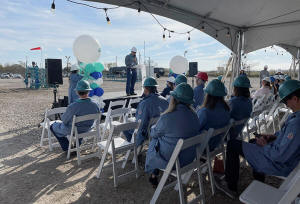Tumbling US natural gas prices prove unstoppable, hurting producers
 Send a link to a friend
Send a link to a friend
 [February 21, 2024] By
Arathy Somasekhar [February 21, 2024] By
Arathy Somasekhar
BRIDGEPORT, Texas (Reuters) - For nearly a year, U.S. natural gas
producers have slammed the brakes on production as prices fall. But
relentless output gains including from oil companies that pump gas as an
oil byproduct have unleashed record supplies.
In the oil versus gas contest, gas producers are losing out. Some are
shutting in wells, canceling projects or selling themselves to rivals to
avoid losses. Natural gas prices this month fell to an
inflation-adjusted 30-year low of $1.59 per thousand cubic feet,
benefiting consumers of the fuel like utilities, but hurting producers
who are selling at nominal prices as low as they were in the depths of
the COVID-19 downturn.
Nowhere is the pain of cheap gas as evident as Denver-based BKV Corp. In
the last five years, it spent $2.7 billion to acquire 4,000 gas wells
and two gas-fired power plants. It also pledged $250 million to build a
dozen underground carbon capture and storage sites to make its gas more
climate friendly.
The nosedive in U.S. gas prices has stalled BKV's plans for an initial
public offering and scuttled the carbon joint venture with Verde CO2 to
couple its gas and power plants with carbon sequestration. BKV last year
narrowly avoided loan defaults with a $150 million bailout by its
parent.
Majority-owned by Thailand power giant Banpu Public Co., the
little-known BKV in 2016 began buying scores of U.S. gas wells, taking
castoffs from oil producers' Exxon Mobil, Devon Energy and others.
"We absolutely want to be the biggest natural gas producer in the
country. That's my ambition," BKV Chief Executive Christopher Kalnin
said in an interview here in December at its first carbon-sequestration
site.
BKV's profits soared to $410 million in 2022 on strong natural gas
prices after Russia's invasion of Ukraine spurred huge demand for
exports of liquefied U.S. gas. The company launched a plan to build a
U.S. version of its Thai parent, tying together natural gas and power.
The plan included an IPO to help finance the gas-to-power expansion and
a complement of carbon-burying wells.

CLIPPED WINGS
But BKV fell back to earth under prices suffering from a relentless
expansion of U.S. natural gas output. Its profit fell to about $79
million in its most-recently reported nine-month period.
U.S. gas firms last year cut drilling 22% to stem the gusher. But the
flows keep coming: The U.S. will pump 105 billion cubic feet a day of
gas this year, up 2.5 billion cubic feet a day in the last year. That
increase is enough to fuel 12.5 million U.S. homes for a day.
In most industries, volume increases are good. More production equals
more profit. But rising output has overwhelmed efforts to curtail
drilling and even demand from frigid temperatures, leading to a price
drop that knocked U.S. gas recently to less than a third of 2022's
average $6.50 per million British thermal units. By contrast, benchmark
WTI crude prices fell just 17%.
Oil prices have held steadier thanks to global supply cuts by major OPEC
producers and their allies.
But soaring gas production, especially from oil companies who view gas
as a byproduct of their output, has proven "relatively insensitive to
prices," said Nicholas O'Grady, CEO of U.S. shale gas explorer Northern
Oil and Gas.
Gas producers have been reluctant to cut output deeply on the prospects
of giant new liquefied natural gas (LNG) plants opening this decade, he
said.
LNG exports would drain the excess gas supplies and should return prices
to levels that make gas profitable to drill again by 2025, O'Grady and
BKV's Kalnin predict.
[to top of second column] |

BKV Corp Chief Executive Officer Chris Kalnin speaks to employees at
the inauguration of its commercial carbon capture and sequestration
project, in Bridgeport, Texas, U.S., December 7, 2023. REUTERS/Arathy
Somasekhar/File Photo

There are four U.S. projects with export permits on the drawing
boards that would consume up to 6.3 billion cubic feet of gas that
if they go ahead would be producing LNG later this decade.
The danger is that third wave of new LNG plants may be delayed or
lost forever. President Joe Biden's administration last month
indefinitely paused reviews of new gas-export permits, jeopardizing
as much as 32 billion cubic feet per day of future consumption.
U.S. natural gas producer Comstock Resources said last week it would
reduce the number of rigs in operation and suspend its dividend
until gas prices rise sufficiently, while rival Antero Resources
said it would cut drilling and drop project spending budget by 26%.
'PERFECT STORM'
BKV, short for Banpu Kalnin Ventures, began operations in
Pennsylvania in 2016 with a plan to buy additional old gas fields
from big oil companies, invest only enough to hold production
steady, wait for prices to rise and - only then - invest in
expanding production.
The moment appeared to arrive in mid-2022. As U.S. gas climbed to
over $9 per thousand cubic feet, BKV's Kalnin launched a costly and
ambitious expansion plan.
In July that year, he closed on a $750 million deal for Exxon Mobil
gas properties in North Texas. The same month, he acquired a Temple,
Texas, gas-fired power plant for $460 million. Weeks later, he
followed that deal with a $250 million partnership with Texas-based
Verde CO2 LLC to build a dozen carbon sequestration sites across the
United States.
"We didn't see prices collapsing like they did," said Kalnin at the
opening of his first carbon sequestration site in December.
Kalnin, a former McKinsey consultant who spent his early years in
Thailand and later worked for the country's national oil and gas
company, hasn't given up on his gas-to-power empire.
"(Gas prices) are setting up for another fly-up in the second half
of 2024," Kalnin said in December, pointing to forecasts for rising
LNG demand.
"There are micro windows for IPOs opening up," a spokesperson added
on Tuesday. "We are hoping to stay ready for when that micro window
opens. Market performances for IPOs and gas prices need to improve,”
she added.
Associated gas, which comes out of wells alongside oil, yanked the
rug out from Kalnin's vision. More than a third of all U.S. gas
production comes from producers drilling for oil, according to
government estimates. That figure is rising as wells mature and more
gas comes up than oil.
BKV last year won a lifeline from its parent, selling shares to
Banpu for $150 million to avoid breaching debt covenants. Most of
the cash was put into a debt service account.
"You have this perfect storm. A warm winter plus too much gas
supply, both primary and associated, and now, possible delays to new
LNG export permits," said Blake London, a managing partner of
private equity fund Formentera Partners.
(Reporting by Arathy Somasekhar in Houston; Editing by Gary
McWilliams and Anna Driver)
[© 2024 Thomson Reuters. All rights
reserved.]
This material may not be published,
broadcast, rewritten or redistributed.
Thompson Reuters is solely responsible for this content.
 |